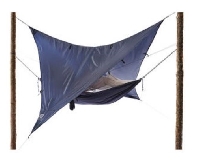How to camp in the wild safely
By Catalogs Editorial Staff

Learn how to camp in the wild safely and have a great outdoors adventure
When the subject of camping is brought up in casual conversation, it seems that people are often put off by the perceived dangers of going out into the woods, they often ask: ?What about the bears?? or ?What about bugs??
While it is true that camping does involve some degree of risk, there are several things experienced outdoors-people do to mitigate these risks. Before you strike out into the wild with your tent, here are a few basic practices that will make your camping trip a whole lot safer.
Hopefully, covering these bases will give you the peace of mind you need to step out into nature and take it all in.
Do Your Research
First and foremost, it is important that you do some research into your campsite. Try to find all the information you can on possible threats from wildlife, weather and anything else so you can take the special precautionary measures required.
In addition to an internet search it is good idea to speak directly with a park ranger or wildlife officer affiliated or familiar with the area where you plan to camp. These are the people most familiar with the area and are generally happy to impart their knowledge to visitors.
Pack Accordingly
Obviously you need to pack for the weather, but you can also pack a few things that will help you avoid potential hazards. For example, if there are snakes in the area it is a good idea to pack thick leather (preferably steel toed) boots with thick rubber tread. Things like mosquito nets and extra camouflage equipment are also good for certain areas.
It is a good idea to ask what special camping equipment you may need to pack when consulting with park rangers or wildlife officers (see the above section). Most importantly, remember to bring a first aid kit with all the basic necessities such as bandages and disinfectant.
~
Be Mindful of Your Food
This is important facet of outdoor safety that may not be obvious to those who have not spent a lot of time camping. If you bring meat, for example, it is a good idea to vacuum seal it. Animals are used to foraging for some of the foods we are likely to bring on outdoor excursions so keep things like fruit, nuts, and berries in a dry goods jar with a tight lid.
If you have food that can be smelled (like a freshly caught fish), store it in high place and cook it a little way away from your main campsite. That way any interested animals will not be drawn directly to you or the place where you will spend most of your time. This will not only keep you safer, but also will help avoid having your campsite destroyed by hungry or curious wildlife.
Always Have an Emergency Plan
This is the most important thing you can do to ensure the safety of yourself and those camping with you. Make sure you know where you can go to contact emergency services. If possible use a mobile hotspot or walkie-talkie to keep yourself in contact with the outside world.
Remember that no matter how many precautions you take you still may end up in need of such services. Many national parks have designated, well-marked emergency trails that will lead you to safety in case of an emergency.
These four general guidelines will help to ensure that your next camping trip is as safe as possible. Camping is a fun, wholesome activity that allows us to bond with one another, commune with nature and bond with each other. Just square away a few of these safety precautions and you?ll have a blast!
Popular Savings Offers











